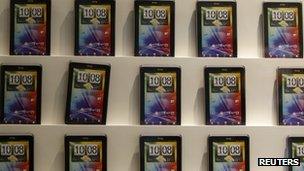HTC told to halt sales in Germany but may ignore order
- Published

Ipcom is demanding HTC remove its 3G devices from German shops unless it pays a licence fee
Smartphone maker HTC has been ordered to halt sales of its 3G devices in Germany by the patent owner Ipcom.
However, the Taiwanese firm has indicated that it will not comply.
HTC said that Ipcom's intellectual property claim had already been ruled invalid by the German Federal Patents court in December 2010.
But experts say the case is not so clear cut and the firm could still be shut out of a market into which it sells over a million devices a year.
The case relates to a wireless patent originally developed by the German conglomerate Bosch for use in a car telephone system.
After exiting the sector the firm sold the rights to Ipcom in 2007.
Abandoned appeal
Two years later the German firm Ipcom challenged HTC's use of the technology in a court in the city of Mannheim, resulting in an injunction being placed on the Asian company.
HTC appealed against the ruling - causing the enforcement order to be suspended pending the follow-up hearing.
A judge had been due to reconsider the case at the start of this week, but HTC withdrew its appeal.
Ipcom said it has now told HTC that it intends to enforce the ban.
"Since HTC has never come up with an offer that adequately reflects the value of these patents, Ipcom has been left with no choice - we will use the right awarded by the courts, likely resulting in HTC devices disappearing from shops during the crucial Christmas season," said Ipcom's managing director, Bernhard Frohwitter.
He added that if HTC ignored the order Ipcom would ask for the phone maker to be fined.
"It's up to the court and could go up to 250,000 euro (£213,000) per violation per phone," Mr Frohwitter said.
He added that Ipcom was still willing to settle, providing HTC agreed to pay a "fair" licence fee.
Ipcom said it had already struck licence agreements with other telecoms companies, but it was pursuing a related claim against Nokia.
Motivation
A statement from HTC suggested that it did not believe it needed to meet Ipcom's demands.
"On November 25, 2011, HTC withdrew its appeal in the IPCom EP1186189 case, finding that the appeal had become redundant since the German Federal Patent Court had previously held the relevant claim of the patent to be invalid," it said.
But patent consultant Florian Mueller has cast doubt on this interpretation of the law in his Foss Patents blog, external.
He wrote that the Federal Patent Court ruling was itself the subject of an appeal, so it would not take force for approximately another two years.
He added that if HTC had believed the claim was truly invalid it would have withdrawn its appeal at an earlier point.
"A withdrawal so shortly before the hearing means to me that HTC was afraid of its expected outcome," he wrote.
HTC v Apple
The research firm IDC estimated that HTC shipped 1.65 million devices to Germany in 2010, representing 16% of its smartphone market.
It said the firm shipped a further 1.43 million mobiles in the first nine months of 2011, representing a 14% share.
While the loss of this market would prove damaging, one analyst said shareholders in HTC are much more concerned about another dispute in the US.
"Investors are focused on Apple's patent claims versus HTC. The next ruling in the case is due on 6 December," said Adnaan Ahmad, global technology analyst at Berenberg bank.
The US's International Trade Commission issued a preliminary ruling against HTC earlier in the year.
If the court maintains that view, it could impose an import ban.
The US smartphone market is several times larger than that of Germany's.
Market share
Confidence in HTC has already been knocked.
The firm has cut sales forecasts twice over the past month citing tougher competition and the global downturn.
Its shares have fallen more than 25% over the past fortnight.
HTC said it expected stronger demand in 2012, but analysts remain unconvinced noting a strong line-up from Samsung and the rise of other Chinese phone makers including ZTE and Huawei.
"Fundamentally product cycles can't last forever unless you have your own ecosystem," said Mr Ahmad.
"HTC doesn't have that as the Android ecosystem is owned by Google. HTC has 15% margins. How can that be sustained in such an uber-competitive industry?"
- Published24 November 2011
- Published22 November 2011
- Published18 October 2011